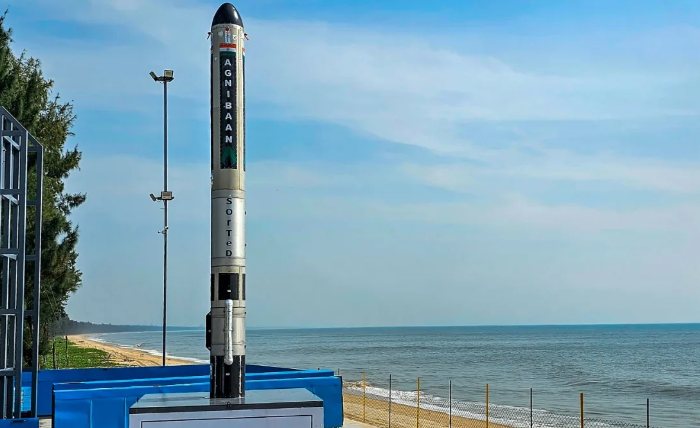On May 30,2024, Agnikul Cosmos, an IIT Madras-incubated startup, successfully launched the world’s first rocket with a fully 3D printed engine, named ‘Agnibaan – SOrTeD’. This historic achievement not only signifies India’s first semi-cryogenic engine to be completely designed and manufactured indigenously but also marks a pivotal moment in the nation’s aerospace capabilities.
Technological Innovation:
Agnikul Cosmos has taken a giant leap in space technology through the use of 3D printing. Co-Founder and CEO Srinath Ravichnandran highlighted the significance of this innovation. “We used 3D printing to make our engines as a single piece of hardware. What’s usually done with thousands of joints and welds got reduced to a single hardware section, thereby reducing cost and lead time in making our rockets.” This approach simplifies the manufacturing process, enhances reliability, and improves the efficiency of the rockets.
The successful launch of ‘Agnibaan – SOrTeD’ is a testament to Agnikul Cosmo’s capability to deliver on its promises. Ravichandran emphasized, “This flight proves almost all the complicated tech needed to make our orbital flights for our customers happen. So, we can now assure our customers that we can safely fly their payloads in our early flights itself.”

Agnikul – Overcoming Challenges:
Building a launch vehicle is an incredibly complex endeavor. Agnikul Cosmos faced and overcame numerous challenges throughout the development process. Ravichandran noted, “Building a launch vehicle as a product is a very different challenge from creating a seamless launch operations process. This process took us some time to figure out and optimize.” The launch involved over 15 teams from the Satish Dhawan Space Centre SHAR (SDSC SHAR), working together meticulously to perfect the launch process through multiple rehearsals and attempts.
Support from IN-SPACe and ISRO:
The successful development and launch of ‘Agnibaan – SOrTeD’ would not have been possible without substantial support from IN-SPACe and the Indian Space Research Organization (ISRO). These organizations played a crucial role in the design and development of the space-worthy hardware, underscoring the importance of government support in fostering innovation in the private space sector.
About Agnikul Cosmos:
Agnikul Cosmos is dedicated to making space accessible to everyone. With a vision of enabling launches from anywhere, anytime affordably, the company focuses on developing launch vehicles that are both cost-effective and customizable according to customer needs.
About Agnibaan:
The flagship launch vehicle, ‘Agnibaan’, is designed to be compatible with the mobile launchpad ‘Dhanush’, allowing for launch flexibility regardless of location. Agnibaan can accommodate payloads ranging from 30 kg to 300 kg, ensuring versatility for a wide range of mission requirements.
Agnikul – Future Plans:
Looking ahead, Agnikul Cosmos plans to undertake an orbital mission by the end of the financial year 2025. The startup is preparing to conduct regular flights starting from 2025, working closely with customers to meet their space mission needs. With its groundbreaking achievements and ambitious future plans, Agnikul Cosmos is set to play a significant role in the global space industry.
Conclusion:
The successful launch of ‘Agnibaan – SOrTeD’ by Agnikul Cosmos represents a major milestone in space technology. By leveraging 3D printing technology and receiving strong support from IN-SPACe and ISRO, the startup has demonstrated its ability to develop innovative, reliable, cost-effective launch solutions. Agnikul Cosmos, with its vision of making space accessible to all, all is poised to revolutionize the space industry and bring space industry and bring space exploration within everyone’s reach.

